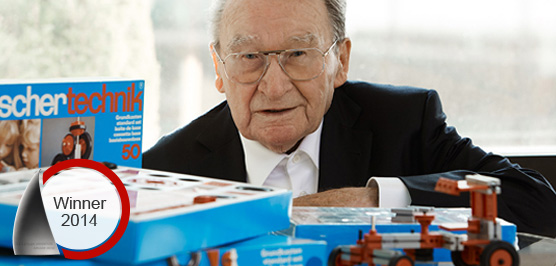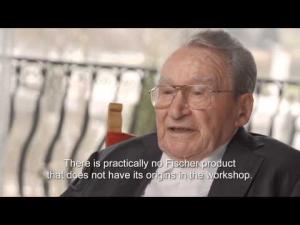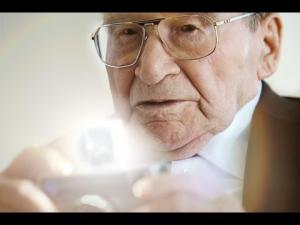Artur Fischer
Wall plug, synchronised flash and many more
Winner of the European Inventor Award 2014 in the category Lifetime achievement
Artur Fischer is one of the world’s most prolific inventors with more than 1 100 applications for patents and utility models in Germany alone and countless more around the world. Best-known for his most popular invention, the expanding wall plug, the 94-year-old “king of the wall plugs” succeeded in revolutionising the construction industry.
Sixty-five years ago, in 1949, Fischer received his first patent for the synchronised photo flash. A long list of inventions and patents followed: from cup holders and CD boxes to storage trays, ventilation nozzles – and even children’s toys.
But it is the small plastic plug Fischer invented in 1958 that has been produced and copied in every corner of the world. This wall plug, or screw anchor, allows screws to be fastened in materials that wouldn’t usually support heavier objects. Rivalled only by screws and nails, it is one of the most frequently used building supplies in the world: About 14 million wall plugs and anchors are produced every day.
Societal benefit
Fischer’s invention transformed construction and do-it-yourself markets and quickly replaced all previous types of wall plugs. But the “Fischer wall plug” was only the starting point: Fischer influenced more than a few new solutions to construction problems, including steel anchors, drill units, chemical fixings and adhesives, and his inventions are being used billions of times a day and all over the world.
Economic benefit
Fischerwerke GmbH, the company Fischer founded in 1948, now has several divisions, including fischer Automotive Systems and fischer Consulting, and is world-market leader in a variety of fixing system-market segments.
The family-owned company, led since 1980 by Fischer’s son Klaus, includes 42 international subsidiaries, employs 4 000 people worldwide and sells its products in more than 100 countries. In 2012, Fischerwerke reported a turnover of EUR 618 million producing 14 000 different products. While the company has production facilities across the world, more than half of the products it sells are still produced in Germany.
How it works
Fischer’s wall plug is inserted into holes or pushed into surfaces to join two components, most often for fastening screws to walls or ceilings. The two halves of the plug expand when a screw is driven into it, and the plug’s anti-rotation fins wedge against the interior of the drill hole to keep the plug from turning.
The plugs are made of heat-resistant nylon, replacing earlier metal plugs with a hemp core. Despite being made from plastic, the plugs help support heavy objects by anchoring screws securely in the surface.
The inventor
Most of Fischer’s inventions can be traced back to personal experiences: the photographer who refused to take a picture because of the fire hazard resulting from a magnesium flashlight; the shutters in his apartment that repeatedly came off the wall; the toy construction set he desired as a child. His whole life, Fischer, now aged 94, has been transforming problems he encounters into solutions.
His more than 1 100 patent applications and utility models brought him countless awards, including the honorary title of “engineer” from the University of Stuttgart.
Did you know?
The fischertechnik toy construction kit for children was launched in 1964 and quickly became a bestseller. These building-block sets, which now are a global standard for educational toys, give children a basic understanding of technology and help them develop hand-eye coordination, fine motor skills, spatial awareness, logical thinking, and creativity. Due to their precision, engineers used some of fischertechnik’s early products to simulate industrial robotics and build models of computer-controlled production plants.
Media gallery
Patent numbers:
Contact
European Inventor Award and Young Inventors Prize queries:
european-inventor@epo.org Subscribe to the European Inventor Award newsletterMedia-related queries:
Contact our Press team#InventorAward #YoungInventors










